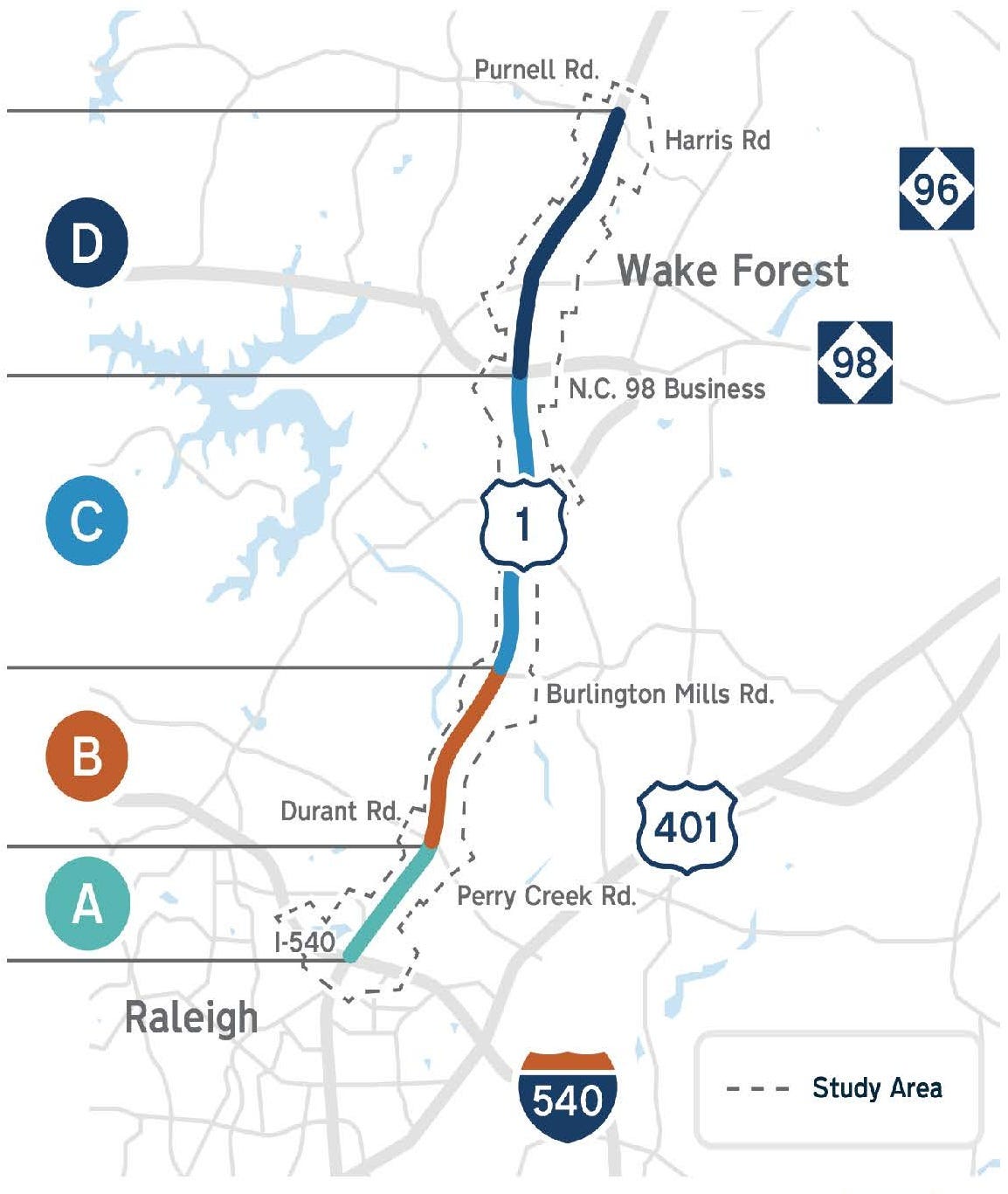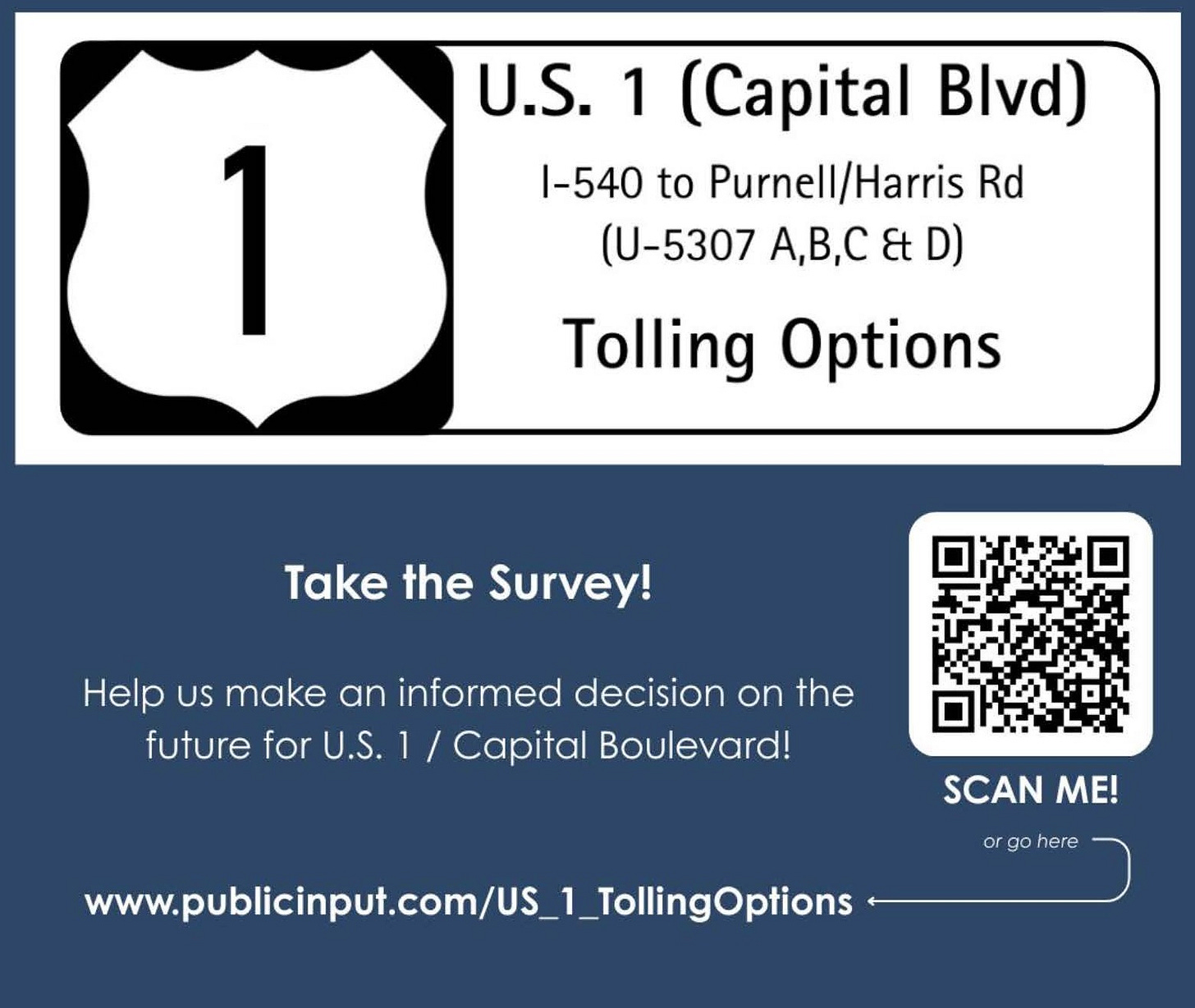Wake County Weighs Tolls on Capital Boulevard (US-1 North) to Fund Long Delayed Highway Upgrade
County seeks public input on tolling scenarios for road enhancements potentially costing more than $1.3 billion.
Holly Springs, NC, Apr. 22, 2025 — Wake County commissioners are reviewing a proposal that could toll a key stretch of Capital Boulevard (US-1 North) as a way to move forward on a major highway upgrade that has been delayed for years due to funding shortages and rising construction costs.
At the April 21 meeting of the Board of Commissioners Growth and Economic Strength Committee, officials from the Capital Area Metropolitan Planning Organization (CAMPO) and the North Carolina Turnpike Authority presented a detailed analysis of the project. They outlined four tolling scenarios aimed at accelerating construction of the corridor between I-540 and the Wake–Franklin County line.
A Long-Delayed but Critical Project
Chris Lukasina, Executive Director of CAMPO, described the project as “an extremely important corridor for the county, for the region, and really for the state of North Carolina.” The original vision to convert this section of US-1 into a controlled-access freeway began in the early 2000s, but five rounds of delays have pushed the timeline back significantly, with the estimated cost now reaching $1.34 billion.
“The problem isn’t not knowing what to do. The problem has been [being] able to get the funding to implement the plan,” Lukasina explained.
David Roy, Director of Innovative Finance for the Turnpike Authority, said, “Tolling truly is a local decision… We like to say it is one tool in the toolbox to help accelerate critical infrastructure projects, but that doesn't mean it's the right answer for every project or every community.”
Four Tolling Scenarios Presented
The Turnpike Authority studied four possible tolling approaches:
Two expressway-style models where all lanes would be tolled, with fixed pricing.
Two express lane models where only one lane in each direction would be tolled, with dynamic pricing based on congestion.
Of the options, Roy said Scenario 2—an expressway-style project treated as an expansion of the Triangle Expressway—“provides a lot of credit benefits when you’re looking at it from a financing capacity perspective.” It would allow the project to move into construction as soon as 2027, with the entire corridor potentially opening in 2033.
Scenarios involving express lanes were found to be less financially viable. Roy noted that one such model would likely delay construction start until after 2030 and stretch completion into 2036.
Concerns About Delays and Diversion
Commissioners asked why the project has continued to be delayed, even after funding was first programmed in 2012. Lukasina said the issue comes down to how transportation projects are prioritized at the state level.
“As all projects have been impacted by inflation and other rising costs… if there are projects that were programmed ahead of this originally, even back in 2012 or 2016, they stay in front of this project. We can’t leapfrog another project.”
When asked if anything could be done in the interim to ease traffic congestion, Lukasina answered, “There are no significant infrastructure improvements in that corridor that are really planned between now and when this project would be planned to start.”
The study also addressed the impact of traffic diversion to alternate routes if tolls were implemented. Roy explained: “You do see some impacts compared against a non-tolled Capitol Boulevard… you could expect to see travel times increase within the local roadway network by up to one minute.”
Public Input and CAMPO Vote
Chair Shinica Thomas, who represents Wake County on the CAMPO Executive Board, emphasized that the decision on whether to proceed with tolling will not come from the Board of Commissioners. Instead, CAMPO will vote on May 21, and she asked each commissioner to provide feedback before then.
“That decision does not require this board to take a vote, the Board of Commissioners does not require you to take a vote or to issue a resolution,” Thomas said. “But I will need to hear from each commissioner how you feel, yay or nay, about moving forward with this.”
To help inform the vote, CAMPO and the Turnpike Authority are gathering public feedback through May 17 via online platforms and in-person events:
April 30, 5–7 p.m. at Abbots Creek Community Center
May 5, 5–7 p.m. at Wake Forest Renaissance Center
CAMPO has made a QR code linking to the project’s background and comment forms available on its website and at local outreach events.
What Happens Next
With the rising cost of delay and limited state dollars available, Lukasina noted the underlying question: “Is tolling an option that we’re interested in, in order to try to stabilize both the timeline for the project delivery and the costs to actually upgrade, to do this upgrade project?”
Commissioners, meanwhile, are urging residents to participate in the public input process. As Thomas put it: “The more folks that you can help make aware of the public input period… the better.”



